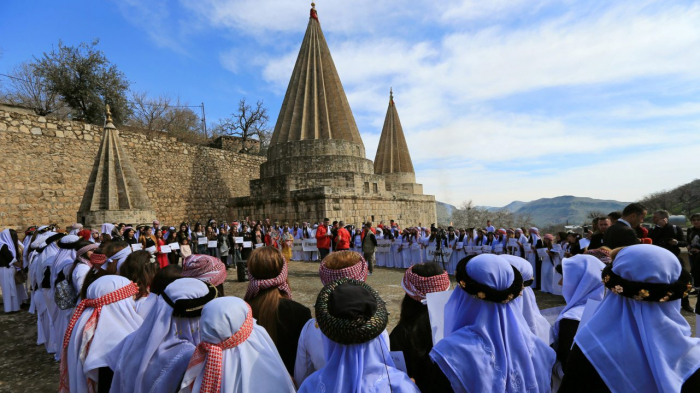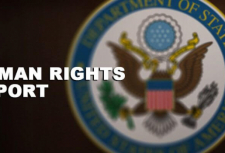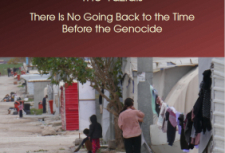Yazidis are finding it increasingly difficult to maintain their religion in Iraq

Excerpts from the USCIRF report
USCIRF notes that the religious freedom situation in Iraq continues to deteriorate in its 2023 report.
USCIRF notes that for the first time in 47 years, the new government officially recognised the Yazidis' ownership of their homes and properties in the Sinjar region of northern Iraq.
The Iraqi government has yet to properly implement the Yazidi Survivors Law, which was passed by parliament in 2021 to compensate Yazidi, Christian, Turkoman and Shabaki victims of ISIS. Similarly, the semi-autonomous Kurdistan Regional Government, which claims Sinjar, has failed to substantially implement the provisions of the 2020 Unity Agreement. The Sinjar Agreement, brokered by the United Nations (UN), aims to stabilise the area and ensure the return of Yazidis displaced by ISIS's genocide.
USCIRF notes in its report that enforced disappearances, extortion, and physical violence and harassment against religious minorities, including Christians and Yazidis, continue in Iraq. Outside Mosul and in the Nineveh Plains, areas with large indigenous religious minorities face psychological pressure at checkpoints, confiscation of land and businesses, and other targeted harassment that may prevent displaced Yazidis from returning to the region, encouraging further emigration. Iraqi forces have attacked religious minorities, displacing at least 3,000 Yazidi civilians already traumatised by their most recent displacement during the 2014 genocide. Christian residents cite insecurity and the threat of ISIL as the main reasons for emigration from the region, leaving their ancient communities on the brink of extinction. Similarly, Yazidi survivors of the genocide fear returning to their homes in Sinjar and remain in displacement camps inland. As of 2022, at least 2,763 Yazidi women and girls abducted from Sinjar by ISIS militants are still missing, many illegally held in camps in northeastern Syria by ISIS fighters and their families.
The population of Iraq is approximately 95-98% Muslim, of which 61-64% are Shia and 29-34% Sunni. Christians include members of the Catholic, Orthodox and Assyrian churches, and there is also a Protestant community of about 1%, although figures are imprecise due to frequent movements within and outside Iraq. Iraq is home to many ethnic and religious minorities. Iraq is home to Kurds, Yazidis, Sabean Mandaeans, Kakai, Shabaks and Turkmen, as well as members of the Assyrian, Chaldean, Syriac, Armenian and other Christian churches.
Tags: #yazidisinfo #aboutyazidis #newsyazidis #religionyazidis #iraqyazidis
Yazidis are finding it increasingly difficult to maintain their religion in Iraq

Excerpts from the USCIRF report
USCIRF notes that the religious freedom situation in Iraq continues to deteriorate in its 2023 report.
USCIRF notes that for the first time in 47 years, the new government officially recognised the Yazidis' ownership of their homes and properties in the Sinjar region of northern Iraq.
The Iraqi government has yet to properly implement the Yazidi Survivors Law, which was passed by parliament in 2021 to compensate Yazidi, Christian, Turkoman and Shabaki victims of ISIS. Similarly, the semi-autonomous Kurdistan Regional Government, which claims Sinjar, has failed to substantially implement the provisions of the 2020 Unity Agreement. The Sinjar Agreement, brokered by the United Nations (UN), aims to stabilise the area and ensure the return of Yazidis displaced by ISIS's genocide.
USCIRF notes in its report that enforced disappearances, extortion, and physical violence and harassment against religious minorities, including Christians and Yazidis, continue in Iraq. Outside Mosul and in the Nineveh Plains, areas with large indigenous religious minorities face psychological pressure at checkpoints, confiscation of land and businesses, and other targeted harassment that may prevent displaced Yazidis from returning to the region, encouraging further emigration. Iraqi forces have attacked religious minorities, displacing at least 3,000 Yazidi civilians already traumatised by their most recent displacement during the 2014 genocide. Christian residents cite insecurity and the threat of ISIL as the main reasons for emigration from the region, leaving their ancient communities on the brink of extinction. Similarly, Yazidi survivors of the genocide fear returning to their homes in Sinjar and remain in displacement camps inland. As of 2022, at least 2,763 Yazidi women and girls abducted from Sinjar by ISIS militants are still missing, many illegally held in camps in northeastern Syria by ISIS fighters and their families.
The population of Iraq is approximately 95-98% Muslim, of which 61-64% are Shia and 29-34% Sunni. Christians include members of the Catholic, Orthodox and Assyrian churches, and there is also a Protestant community of about 1%, although figures are imprecise due to frequent movements within and outside Iraq. Iraq is home to many ethnic and religious minorities. Iraq is home to Kurds, Yazidis, Sabean Mandaeans, Kakai, Shabaks and Turkmen, as well as members of the Assyrian, Chaldean, Syriac, Armenian and other Christian churches.
Tags: #yazidisinfo #aboutyazidis #newsyazidis #religionyazidis #iraqyazidis


























